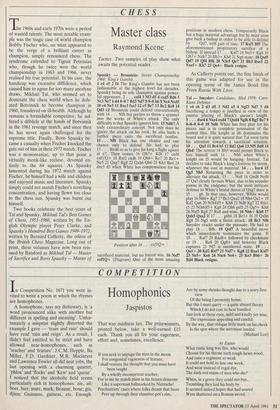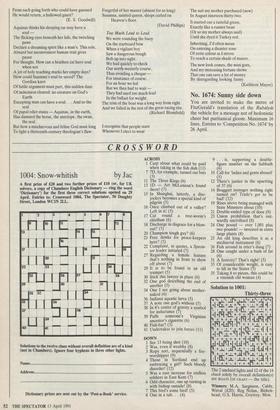COMPETITION
Homophonics
Jaspistos
In Competition No. 1671 you were in- vited to write a poem in which the rhymes are homophones.
A homophone, says my dictionary, is 'a word pronounced alike with another but different in spelling and meaning'. Unfor- tunately a misprint slightly distorted the- example I gave — 'train and rain' should have read 'rain and reign'. As a result, I didn't feel entitled to be strict and have allowed near-homophones, such as `teacher' and 'feature'. J.C.M. Hepple, Ba Miller, F.D. Gardiner, M.R. Macintyre and Lawrence Fowler all did neat jobs, the last opening with a charming quartet, `phlox' and 'flocks' and 'Kew' and 'queue'. I noticed that the alcoholic field seems particularly rich in homophones: ale, ail; beer, bier; marc, mark; Beaune, bone; gin, djinn; Guinness, guineas, etc. Enough. That way madness lies. The prizewinners, printed below, take a well-earned £15 each. Thank you all for your eagerness, effort and, sometimes, excellence.
If you seek to impugn the man in the moon For congenital vagueness of feature, I shall venture the thought that you must have been taught By a wholly incompetent teacher; For to me he stands plain in his frozen demesne Like a superman hallmarked by Nietzsche! Psychiatrists' cases where folks dream that faces Peer up through their chamber-pot's rim, Are by some shrinks thought due to a scary first view Of the being I presently hymn; But this I must query — a quite absurd theory Which I do not care to hear bandied.
Just look at those eyes, mild and kindly yet wise, The expression appealing and candid.
By the way, that oblique little mark on his cheek Is the spot where the astronaut landed.
(Michael Lee) At Easter What rustic king was this, who would Choose for his throne such rough-hewn wood, And raise a regiment so weak It could not hold its line one week, And wear instead of regal dye, The dark-red stains of men who die?
When, in a grave they could not buy, Trembling they laid his body by It seemed indeed hopes that had soared Were shattered on a Roman sword. From such going forth who could have guessed He would return, a hallowed guest?
(E. S. Goodwill)
Aquinas thinks his sleeping cat may have a soul -
The flicking eyes beneath her lids, the twitching paws Declare a dreaming spirit like a man's. This sole, Absurd but inconvenient human trait gives pause For thought. How can a heathen cat have soul when not A jot of holy teaching marks her empty days? How could Susanna's soul be saved? The Gordian knot Of futile argument must part, this sudden daze Of indecision cleared: no creature on God's Earth Excepting man can have a soul. . . And so the seal Of papal edict states — Aquinas, in the earth, Has damned the horse, the antelope, the swan, the seal.
But how a mischievous and feline God must long To light a thirteenth-century theologian's flaw: Forgetful of her master (absent for so long) Susanna, sainted queen, sleeps curled on Heaven's floor.
(David Phillips) Too Much Lead to Lead We were rounding the buoy On the starboard bow When a vigilant boy Saw a dangerous bough Bob up into sight.
We had quickly to check Our north-westerly course, Thus avoiding a cheque - For insurance of course.
For an hour we led But we then had to wait - They had used too much lead In the ballast for weight.
The trim of the boat was a long way from right And we failed in the test of the great racing rite.
(Richard Blomfield) I recognise that people stare Whenever I elect to wear The suit my mother purchased (new) In August nineteen thirty-two.
It started out a tasteful green, Exactly like a runner bean (Or so my mother always said) Until she dyed it Turkey red.
Inheriting, I'd often moan On entering a disaster zone Of eerie colour as I strove To reach a certain shade of mauve.
The new look comes, the mini goes, And my increasing fortune shows That one can save a lot of money By disregarding looking funny.
(Kathleen Mayor)



























































 Previous page
Previous page